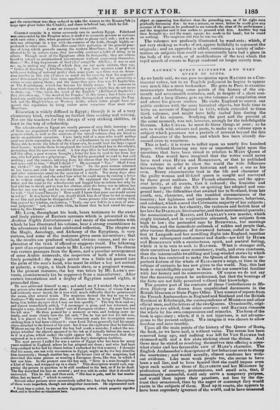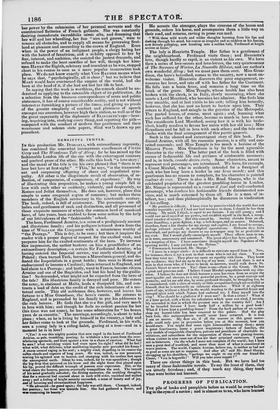RAUMER'S QUEEN ELIZABETH AND MARY QUEEN OF SCOTS.
As we lately said, we can pass no opinion upon RAUMER as a Con- tinental writer, but in an English judgment he begins to appear very much like a mere bookmaker. lie goes to Paris to examine manuscripts touching some points of the history of the six- teenth and seventeenth centuries, and, in despite of a short resi- dence and a long illness, gets up two volumes of compilation over and above his graver studies. He visits England to search our public archives with the same historical objects, but finds time to write an account of' England in 1835, which extended to three thick volumes, and might have fully tasked him during the whole of his sojourn. Studying the past and the present at the same moment, was not, however, enough for the indefatigable German. Like C.ESAR, he must do three things at once; S3 he sets to work with scissors and paste, to make up a volume upon a subject which possesses not a particle of interest beyond the fate and character of the heroine, and which has been already dis- cussed even to weariness.
This is bad ; it is worse to inflict upon us nearly five hundred pages, without throwing any new or important light upon the questions that have been raised in relation to MARY Queen of Scots. One would have imagined that the writer could never have read even HUME and ROBERTSON, or that he published this volume in order to show the world the wide difference between the mind of a great historian and such a one as his own. Every characteristic trait in the life and character of the guilty woman and ill-fated queen is caught and conveyed by those great authors. Her French education, and the appa- rent levity, at all events, that it induced ; the feminine and romantic regret that she felt on quitting her adopted and con- genial land; the difficulties that awaited her in Scotland, from her youth, sex, character, and the troubled circumstances of the country; her lightness and imprudence in discourse, behaviour, and conduct, which soured the Calvinistic majority of her subjects ; the suspicions as to her chastity, the rashness and foolish heat of her love for DARNLEY, his character, and their matrimonial quarrels; the assassination of Rizzi°, and DARNLEY'S own murder, which singly irritated, and in conjunction alienated, her subjects from high to low ; the pretended rape by Borstwam., her marriage with him, and the immediate outbreak of nobles and people that,. after various fluctuations of downward fortune, ended in her de- feat at Langside and her unwilling flight into England, together with her subsequent confinement and death—are told by Hums. and ROBERTSON with a succinctness, spirit, and poetical feeling, which it is in vain to seek in RAUMER. What is stranger still, their narratives have more consistency, truth, and even exactness, than the interminable twaddling and long-winded stories by which RAUMER has contrived to make the Queen of Scots the most im- portant feature of the whole of ELIZABETH'S reign, or than in the volume of extracts he has now given to the world. Nay, this last book is unintelligible except to those who are somewhat familiar- with her history and its controversies. Of course we do not say that the meaning cannot be understood, but that the bearings of the facts are not fully perceived without that knowledge. The greater part of the contents of these Contributions io Mo- dern History are drawn from unpublished documents in the British Museum or State Paper Office. They consist of reports from the French Ambassadors in England and Scotland and the British Resident at Edinburgh, the correspondence of Ministers and other official men, and the letters of the two Queens. Occasionally, origi- nal papers are added, from other sources; and RAUMER connects the whole by his own compressions and remarks. The form of the book is epistolary; which, if it is not injurious, is not advanta- geous to the present subject. We imagine it was chosen to allow freedom and save trouble.
Upon all the main points of the history of the Queen of Scots,-
the book, as we have said, is without value. The cream has been removed long ago, and nothing was left for VON RAUMER but skimmed-milk and a few clots sticking about the dishes. And these may be stated as resolving themselves into offering a some- what closer and less favourable view of MARY'S character. The English Ambassador's descriptions of her behaviour seem to stamp the courtezan; and would morally, almost condemn her with- out evidence. Like most weak people too, she seems to have been a sad liar, and to have fancied that she could impose even `upon such minds as those of ELIZABETH and her Ministers by professions of courtesy, protestations, and small arts, that, if momentarily successful, could only serve a temporary purpose, and would then injure their practicer, not less by the dis- trust they occasioned, than by the anger or contempt they would excite in the subjects of them. Bred up in courts, she appears to have been supremely ignorant of the world, and to have measured her power by the submission of her personal servants and the overstrained flatteries of French gallants. She was constantly desiring immoderata incredibilia nimis alta, and dreaming that her will and her wheedling, her fine " airs and graces," were to remove all obstacles, and to supply all means for governing Scot- land at pleasure and succeeding to the crown of England. Even when in the power of an indignant people, a clergy hating her with the hatred of fanaticism, and a nobility opposed to her by fear, interest, and ambition, she resisted the justest demands, and refused to make the least sacrifice of her will, though her kins- man HENRY the Eighth, arbitrary and truculent as he was, stopped short in his course as soon as a mere popular insurrection took place. We do not know exactly what VON RAUMER means when he says that, "psychologically, all is clear ;" but we believe that MARY would have overturned the empire of the world, had she been at the head of it, if she had not lost her life to boot.
In saying that the work is worthless, the remark should be un- derstood as applying to the ostensible object of its publication. As a selection from the business correspondence of acute and politic statesmen, it has of course considerable reality, and is not without interest as furnishing a picture of the times, and giving us proofs of the greater simplicity of conduct and plainness of speech amongst our ancestors, however high their station, as well as of the the great superiority of the diplomats of ELIZABETH'S age—hear- ing, inquiring into, studying every thing,and reporting the pith— compared with the conduct of modern fine gentlemen and their wearisome and solemn state papers, (God wot !) drawn up per precedent.



























 Previous page
Previous page